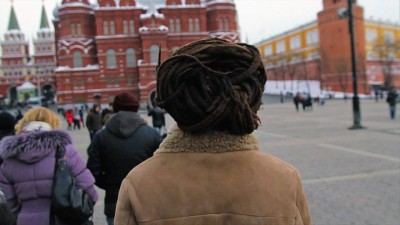| Reviews & Columns |
|
Reviews DVD TV on DVD Blu-ray 4K UHD International DVDs In Theaters Reviews by Studio Video Games Features Collector Series DVDs Easter Egg Database Interviews DVD Talk Radio Feature Articles Columns Anime Talk DVD Savant Horror DVDs The M.O.D. Squad Art House HD Talk Silent DVD
|
DVD Talk Forum |
|
|
| Resources |
|
DVD Price Search Customer Service #'s RCE Info Links |
|
Columns
|
|
|
Russian Winter, The

Reviewed at the 2012 Tribeca Film Festival
For such a collaborative medium, and one that combines so many different art forms into one smooth broth, films detailing the collaborative process are in disturbingly short supply; whether it's the act of making music, creating theater, or crafting dance, most filmmakers either shuttle the actual act of creation off-screen, or presume it's voodoo that arrives via methods unexplained, like some sort of divine intervention. If The Russian Winter offered nothing else, it would present several refreshingly straight-forward glimpses into the act of making music--an act that, for those of us not in possession of the gift to do so, seems like a miracle.
But that's not all this fine documentary from director Petter Ringbom provides. It has a redemption story to tell, and a powerful one: that of the musician John Forté, who worked with the Fugees (he co-wrote and produced two songs on The Score, and performed with the group as well) and recorded a well-received if commercially flat solo album before he was arrested with $1.4 million worth of liquid cocaine at the Newark airport. He was sentenced to 14 years in prison, but his cause was taken up by Carly Simon, whose petitioning of politicians ultimately led to a 2008 pardon by outgoing president George W. Bush.
The Russian Winter unfolds that story in an unexpected, unconventional fashion--if you're not familiar with Mr. Forté's case (and I was not), it is revealed in pieces, a story here, an anecdote there, many of them told during the film's central event: a tour of Russia in the winter of 2011. Forté and his band spent nine weeks there, crossing the country, performing, recording, collaborating with musicians from there and elsewhere, donating profits to charitable organizations. His music is hard to pin down; he has a unique, experimental, evocative style, one that merges hip-hop rhythms and R&B soul with acoustic guitars and folk openness (the closest thing I can compare it to, interestingly enough, is the music on Lauryn Hill's less-than-enthusiastically received MTV Unplugged record).
Director Ringbom (who also edited) presents the examples, familiar from countless other tour docs, of the irritations of life on the road--here compounded by local customs. This is "the Russian way, " Forté is told. "You have to be patient." They travel (via, at one point, the famed Trans-Siberian railway), they do press, they perform shows. Early in the trip, the gigs are a little strange: they perform at the ornate home of the U.S. ambassador, at a beauty pageant, at an orphanage. But as local artists are added to the bills, and record songs with Forté, his local popularity soars; by the end of the visit, he's doing shows for more than two thousand fans.
The sequences showcasing those collaborations are patient, curious, and rewarding--he's looking for openings in his songs and in theirs, places where their voices can join, where their ideas can form into a cohesive singularity. Ringbom doesn't cut to the win here; the struggle to make the pieces fit is a real one, and not overlooked. These things don't always play out to a happy ending, either. One long, bracing sequence drills in on the minutiae of a session with an orchestral arranger, who maintains that since he has made contributions to the music, he deserves a co-author credit in addition to his agreed-upon one for arrangement. Forté stands firm, and leaves the session. "No one is gonna take advantage of me," he explains calmly. "No one."
His subsequent explanation of why he would not budge there (which is accompanied by a keen analysis of the very subtle representative role that race takes on in a conversation like that) confirms what we've already gathered from his interviews and private moments in the film: this is an interesting, thoughtful guy, with many layers to penetrate. He has engrossing, remarkable stories to tell--of how he taught himself to play the guitar while in prison, and how his time there also, in a roundabout way, forced him to accept and cultivate his own singing voice.
The Russian Winter takes its time throughout Forté's journey, which is perhaps why its ending seems so rushed and incomplete; as an audience, we'd like to share in the triumph of that last show, or at least what seems to be a triumph (maybe it wasn't, hence its absence). Nonetheless, there's much to recommend here--in the music, in the storytelling, and in the indelible fusion of the two.
Jason lives in New York. He holds an MA in Cultural Reporting and Criticism from NYU.
|
| Popular Reviews |
| Sponsored Links |
|
|
| Sponsored Links |
|
|
| Release List | Reviews | Shop | Newsletter | Forum | DVD Giveaways | Blu-Ray | Advertise |
|
Copyright 2024 DVDTalk.com All Rights Reserved. Legal Info, Privacy Policy, Terms of Use,
Manage Preferences,
Your Privacy Choices | |||||||











